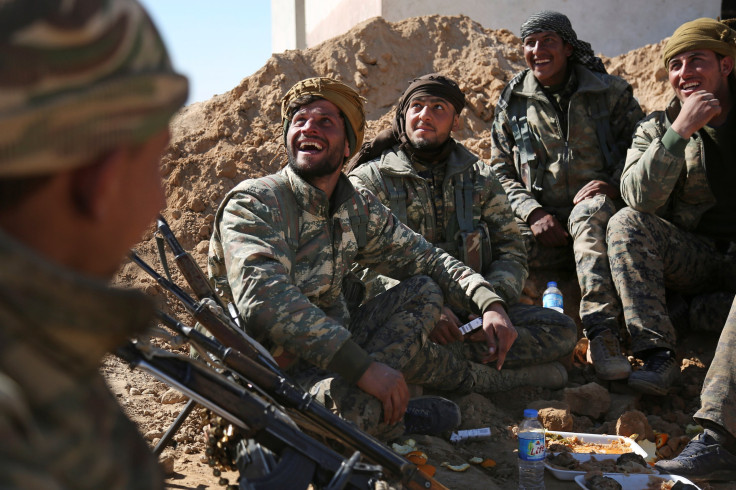Syrian War Over? Assad Winning As US, Russia Join Forces Against Turkey

The U.S. and Russia blocked an attempt this week by Turkey and its Syrian rebel allies to take positions from Kurdish forces that have recently allied with the Syrian army in northern Syria, resulting in a major shift in momentum among the three nations sponsoring separate actors in the country's six-year civil war.
The U.S., Russia and Turkey, as well as the forces they support on the ground, all have been active in fighting the Islamic State group, also known as ISIS. As the ultraconservative Sunni Muslim group has lost territory, however, the opposing powers vying for control in Syria have continued to shift loyalties and broker deals in an attempt to increase their influence over the country, which fell into civil war when a series of anti-government protests in 2011 transformed into an armed insurgency. In the latest development, the U.S. and Russia, once the primary sponsors of opposing forces in the war, have adopted a joint position against mutual ally Turkey, giving a major boost to forces loyal and sympathetic to Syrian President Bashar Assad.
The Pentagon, once an avid supporter of Syrian rebel groups fighting Assad, said Monday it had deployed hundreds of troops to defend the Kurdish-dominated Syrian Democratic Forces in the northern Syrian city of Manbij against advancing Turkish forces and allied Syrian opposition groups. The U.S. has put its weight behind the Kurds, Arabs and various ethnic minorities that make up the SDF coalition. Turkey, however, has labeled Kurdish militants such as those belonging to the People's Protection Units within the SDF as terrorists and has refused to recognize their position in the larger fight against ISIS. Meanwhile, SDF forces, also once supportive of the Syrian opposition, ceded defense lines to the Syrian army as part of a Moscow-brokered deal.
The Kurds have attempted to remain mostly neutral in the fight between the Syrian government and opposition groups, but drifted closer to the government as Islamist groups, including those linked to ISIS and al-Qaeda, became increasingly influential among opposition forces and frequently attacked Kurdish and other minority positions. The relationship between Kurds and Syrian rebels was further strained when Turkey launched a direct intervention on the opposition's behalf in August, targeting both ISIS and Kurds. With the U.S. backing the Kurds, Russia backing the Syrian army and the Kurds allying with the Syrian army, at least tentatively, the isolation of Turkey and its rebel allies has presented a huge strategic victory for Assad, whom Western and Arab Gulf governments once urged to step down.
Assad's sponsor, Russia has also emerged as the international leader in exploring a political solution to the conflict. Moscow, along with its allies in Tehran, managed to gather representatives from the Syrian government and opposition for parallel peace talks in Astana and Geneva. Last month, the U.S. and Russia issued a joint statement as co-chairs of the International Syria Support Group to advocate a cessation of hostilities that excluded ISIS and affiliates of al-Qaeda or other groups designated as terrorist organizations by the U.N. Security Council.
As of the conflict lines drawn January, the Syrian government was believed to be in control of 65.5 percent of Syria's population versus 12.5 percent being held by Syrian rebels and 12.5 percent under Kurdish control. The Pentagon has reportedly considered staging a ground intervention in Syria against ISIS, something Assad said he would welcome only if coordinated with Moscow.
© Copyright IBTimes 2025. All rights reserved.






















